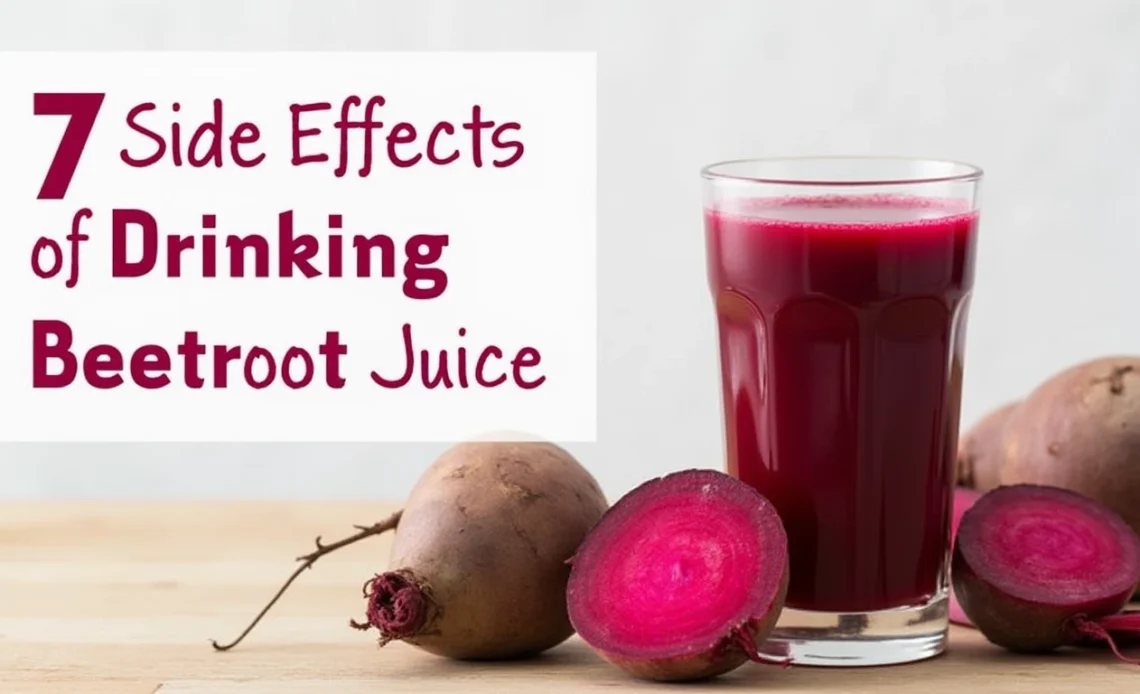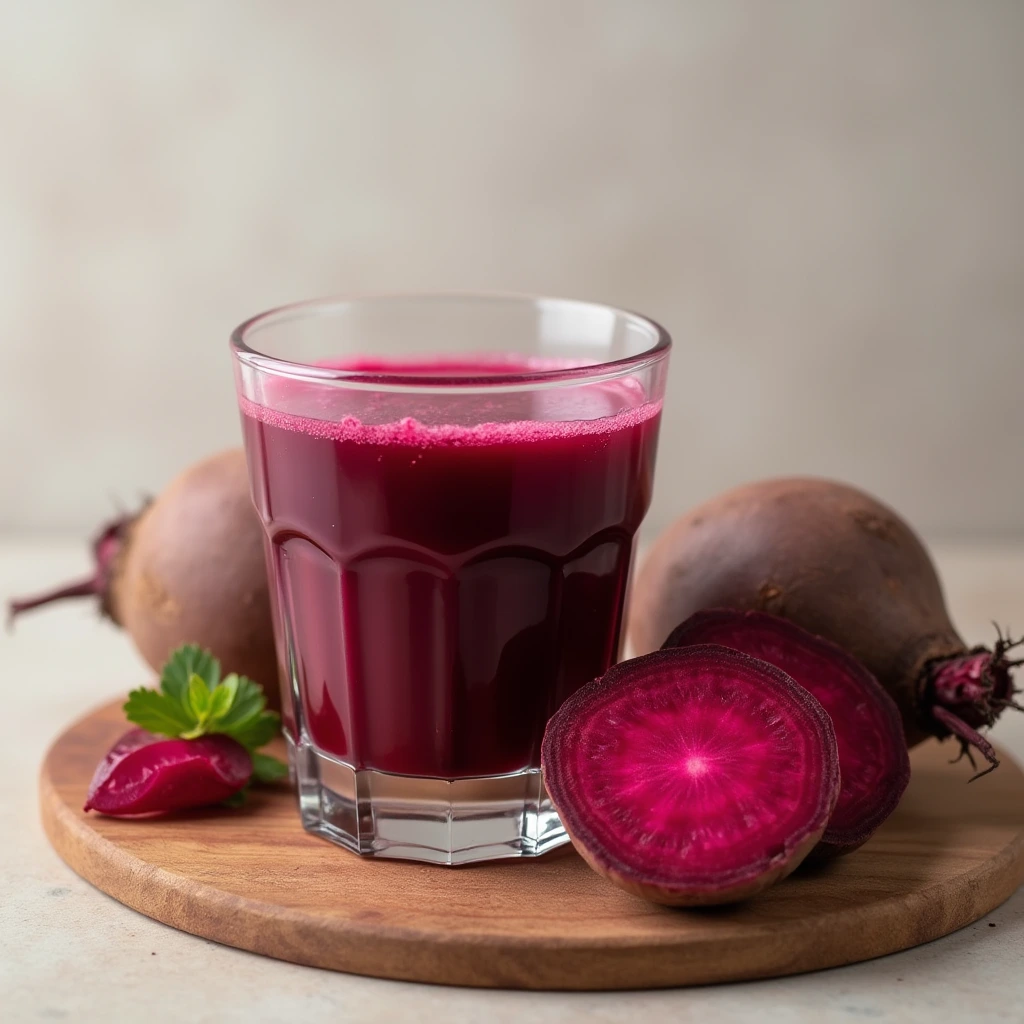
Beetroot juice has become increasingly popular in the world of health and wellness, often touted as a natural energy booster and metabolism-enhancer. As part of a health-conscious diet, many people integrate this vibrant red beverage into their daily routines, especially in the form of smoothies. However, like any dietary change, it’s important to be aware of the potential side effects of drinking beetroot juice regularly. This article will discuss seven key side effects to consider before incorporating beetroot juice into your daily routine, particularly if you’re following health plans such as The Smoothie Diet 21 Day or focusing on fat-burning recipes.
1. Red Urine or Stool: A Common Side Effect
One of the most common side effects of drinking beetroot juice is a change in the color of your urine or stool. This is a harmless phenomenon known as beeturia. Beetroot contains betalains, which are natural pigments that can pass through your digestive system. When consumed in large amounts, these pigments may cause your urine or stool to turn red or pink. While this may seem alarming, it’s completely normal and typically fades within 24 hours after drinking beetroot juice.
If you experience beeturia, it can be a sign that your body is absorbing the beneficial compounds in beetroot juice. However, if you have concerns or if the change in color lasts longer than expected, it’s always a good idea to consult with a healthcare professional to rule out any other underlying issues.
2. Lowered Blood Pressure: A Natural Benefit for Some, but Not All
Beetroot juice is widely known for its ability to help lower blood pressure. This is because it’s high in nitrates, which the body converts into nitric oxide. Nitric oxide helps to relax and widen blood vessels, improving blood flow and lowering blood pressure. For people with high blood pressure, this can be a great benefit, and incorporating beetroot juice into your diet can support heart health.
However, if you already have low blood pressure, drinking beetroot juice might cause it to drop further. This can lead to symptoms like dizziness, lightheadedness, or fainting. If you’re following The Smoothie Diet 21 Day or any other fat-burning recipe plan, and you already have a tendency toward low blood pressure, it’s important to monitor how your body reacts to beetroot juice. In such cases, you may want to limit your intake or consult your doctor before adding it to your diet.

3. Digestive Issues: Bloating and Gas
Another potential side effect of drinking beetroot juice is digestive discomfort. Beetroot contains a type of fiber that can be hard for some people to digest, especially when consumed in liquid form. As your body processes the fiber and natural sugars in beetroot juice, you may experience bloating, gas, or even mild stomach cramps.
If you’re following a program like The Smoothie Diet or trying different fat-burning recipes, be mindful of how your body reacts to the inclusion of beetroot juice in your diet. If you’re prone to digestive issues, it may help to start with small amounts of beetroot juice and gradually increase your intake over time. Alternatively, blending beetroot with other ingredients, such as in breakfast smoothies, can help ease the digestive burden and create yummy smoothies that are more tolerable.
4. Increased Urination: A Hydration Effect
Beetroot juice is a natural diuretic, which means it can increase urination. While this is typically a sign that your body is flushing out excess fluids and toxins, it can be inconvenient or bothersome if you’re not prepared for it. If you’re consuming beetroot juice as part of The Smoothie Diet 21 Day or any detox plan, you might find that you need to urinate more frequently than usual.
This increase in urination can be particularly noticeable when you drink beetroot juice on an empty stomach in the morning. It’s important to stay hydrated and drink plenty of water throughout the day to prevent dehydration. If you’re concerned about the frequency of urination, it’s best to adjust your intake or consult a healthcare provider.

5. Potential for Kidney Stones (in Rare Cases)
Beetroot is rich in oxalates, compounds that can contribute to the formation of kidney stones in susceptible individuals. Oxalates are naturally occurring substances in many foods, and in the case of beetroot, they can bind to calcium and form calcium oxalate, which may contribute to kidney stones.
While this is a rare side effect, if you have a history of kidney stones or are prone to developing them, you should be cautious about consuming large quantities of beetroot juice. If you’re following The Smoothie Diet or using beetroot in fat-burning recipes, you may want to limit your intake of beetroot juice or combine it with other ingredients that can help reduce oxalate absorption. Always check with your healthcare provider if you have concerns about kidney stones.
6. Risk of Allergic Reactions
Though rare, some individuals may be allergic to beetroot. If you experience symptoms such as itching, swelling, or difficulty breathing after drinking beetroot juice, you may have an allergy to the root vegetable. This is an uncommon side effect, but it’s essential to be aware of it, particularly if you’re new to incorporating beetroot juice into your diet.
If you have a known sensitivity to beets or any other root vegetables, you should avoid drinking beetroot juice. As with any new food or drink, start with small amounts to assess how your body reacts. If you experience any signs of an allergic reaction, seek medical attention immediately.
7. Potential for Staining Teeth
Beetroot juice, due to its deep red color, can stain your teeth over time, especially if consumed regularly. While this isn’t a harmful side effect, it’s something to be aware of if you’re drinking beetroot juice daily as part of The Smoothie Diet or other smoothie-based fat-burning recipes.
To reduce the risk of staining, it’s helpful to drink beetroot juice with a straw to minimize contact with your teeth. Additionally, drinking plenty of water after consuming beetroot juice can help wash away any residue. If you’re concerned about staining, consider maintaining good oral hygiene and visiting your dentist for advice on how to manage beetroot juice stains.

How to Make the Most of Beetroot Juice for Your Health
Despite these potential side effects, beetroot juice can offer numerous benefits when consumed in moderation. Whether you’re following The Smoothie Diet or simply looking for a tasty way to boost your energy and metabolism, beetroot juice can be a valuable addition to your diet. Here’s how to get the most out of beetroot juice while minimizing potential side effects:
- Balance Your Diet: Incorporate beetroot juice into a well-rounded diet that includes a variety of fruits, vegetables, and lean proteins. This can help prevent any digestive discomfort or nutrient imbalances.
- Pair with Other Ingredients: Combine beetroot juice with other nutrient-dense ingredients to create delicious, fat-burning smoothies. Some great options include berries, spinach, carrots, and citrus fruits. These combinations can also enhance the health benefits of your smoothie while making it more enjoyable to drink.
- Moderate Your Intake: If you’re new to drinking beetroot juice, start with small quantities and gradually increase your intake. This allows your body to adjust and helps reduce the risk of digestive issues or other side effects.
- Stay Hydrated: Since beetroot juice is a diuretic, it’s important to drink plenty of water throughout the day to stay hydrated and support your body’s natural detoxification processes.
- Monitor Your Blood Pressure: If you have high or low blood pressure, keep track of how your body reacts to beetroot juice. If you experience any negative symptoms, adjust your intake accordingly.
- Consult a Healthcare Provider: Before making beetroot juice a regular part of your diet, particularly if you have any health conditions such as kidney stones or allergies, it’s always a good idea to consult with a healthcare professional.
Conclusion
Incorporating beetroot juice into your diet, whether as part of The Smoothie Diet 21 Day or fat-burning recipes, can offer a range of health benefits, including increased energy, improved metabolism, and support for a healthy lifestyle. However, as with any dietary change, it’s important to be aware of the potential side effects, such as changes in urine color, digestive issues, and the risk of kidney stones. By consuming beetroot juice in moderation, staying hydrated, and monitoring your body’s response, you can enjoy the many benefits of this vibrant, nutrient-packed juice while minimizing any unwanted side effects.




